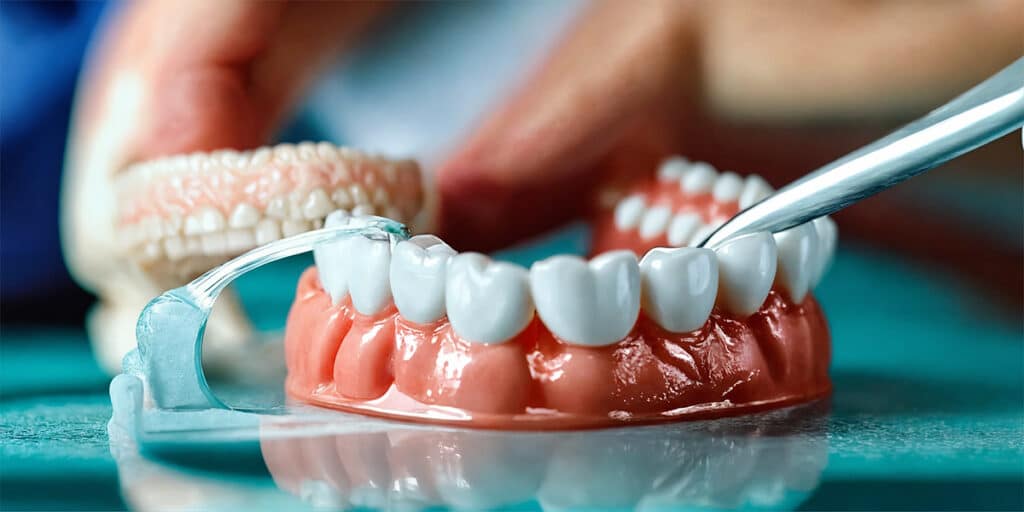Transitioning to life with dentures can be a significant adjustment, particularly when it comes to maintaining a balanced and nutritious diet. Many new denture wearers find themselves facing dietary limitations, unsure of how to enjoy a varied and wholesome diet without discomfort. This guide aims to demystify the process, offering practical tips and innovative solutions to ensure you can continue to eat well and support your overall health, even with dentures.
Understanding Denture Diet Limitations
Dentures can introduce challenges to chewing and biting, affecting how you consume fruits, vegetables, and meats. These difficulties can lead to nutritional gaps if not addressed thoughtfully.
- The texture of foods becomes a crucial consideration.
- Sticky or very hard foods might require avoidance or caution.
Nutritional Strategies for Denture Wearers
Navigating dietary choices with dentures can seem daunting, but it doesn’t have to mean compromising on nutrition or flavor. To ensure you’re receiving a balanced diet while also caring for your dentures, consider adopting these strategic approaches:
Soft but Nutrient-Rich Foods
Opting for foods that are easy on your dentures yet brimming with essential vitamins and minerals is key. The goal is to maintain a nutritious diet without causing discomfort or damage to your dentures.
- Examples include well-cooked vegetables, which can be soft enough for comfortable chewing yet are packed with fiber, vitamins, and minerals. Consider choices like spinach, which wilts to a tender texture when cooked and is high in iron and calcium.
- Ripe fruits, such as bananas and peaches, offer natural sweetness and a soft texture that’s easy on dentures. They’re excellent sources of vitamins A and C, as well as fiber.
- Tender meats can also be part of a denture-friendly diet. Slow-cooked chicken or fish that flakes easily allows you to consume necessary proteins without struggling to chew.
Smoothies and Soups
Both smoothies and soups are excellent for getting a wide range of nutrients in a denture-friendly form. They can be easily adapted to suit your taste preferences and nutritional needs.
- Smoothies provide a refreshing method to consume a variety of fruits and vegetables. Incorporate spinach or kale for an iron boost, and add a scoop of protein powder or Greek yogurt for protein. The liquid form makes it easier to consume without putting stress on your dentures.
- Soups serve as a warming and comforting meal option that can be loaded with nutrients. Blend soups to a smooth consistency to avoid chunks that require heavy chewing. Ingredients like lentils, split peas, or soft-cooked carrots add depth, flavor, and nutrition.
Proper Food Preparation
The way you prepare your food can significantly impact how denture-friendly it is. Emphasizing gentle cooking methods and mindful food presentation can enhance your dining experience.
- Cutting foods into smaller, bite-sized pieces reduces the effort needed to chew, making meals more enjoyable and less of a chore.
- Steaming or roasting are excellent methods to soften foods while preserving their nutritional integrity. Vegetables like broccoli or squash become much more manageable when cooked until tender.
Tools and Techniques for Enjoyable Eating
When navigating the culinary world with dentures, the right approach can transform mealtime from a challenge into a delightful experience. Leveraging specific tools and adopting certain eating practices ensure that enjoying a wide array of foods remains a joy, not a chore.
Denture-Friendly Utensils
The choice of utensils plays a significant role in how comfortably you can eat. Utensils that are ergonomically designed to complement the use of dentures can make a noticeable difference.
- Ergonomically designed utensils are crafted to fit more naturally in your hand, making it easier to control how you cut and consume your food. This control is crucial for denture wearers, as it helps in managing bite sizes and textures, ensuring that eating does not cause discomfort or place undue pressure on dentures.
- Utensils with soft grips also reduce strain on your hands, allowing for a more relaxed dining experience. This can be particularly beneficial during longer meals, ensuring that your focus remains on the enjoyment of food rather than the effort required to eat it.
Mindful Eating Practices
How you eat can be just as important as what you eat. Slow, deliberate eating practices not only enhance the sensory experience of dining but also contribute significantly to denture wearers’ comfort and digestion.
- Taking your time with meals allows for more effective chewing and saliva production, critical components in the digestive process. This approach ensures that food is adequately broken down before swallowing, easing digestion and reducing the risk of gastrointestinal discomfort.
- Chewing slowly and thoroughly is doubly important for denture wearers. It minimizes the chances of denture displacement during meals and lessens the likelihood of particles becoming trapped under dentures, which can cause irritation or sores. Furthermore, thorough chewing helps in extracting the maximum flavor and nutrition from your food, turning each meal into an opportunity to nourish your body and delight your palate.
Staying Hydrated
For everyone, hydration is crucial, but it holds special importance for those wearing dentures. Ensuring you drink enough water throughout the day is essential for both your oral and overall health.
Drinking plenty of water supports various bodily functions, including digestion, which can sometimes be a bit more challenging for denture wearers. Adequate fluid intake ensures that food moves through the digestive system more smoothly, aiding in the absorption of nutrients and the prevention of constipation.
Beyond its role in digestion, water helps to maintain the health of the mouth’s tissues. Adequate hydration keeps the mucosal linings moist and resilient, which is vital for comfort and the prevention of irritation. For denture wearers, this can mean fewer sores and a more comfortable fit.
Moreover, water is instrumental in flushing away food particles and residual bacteria in the mouth, reducing the risk of oral infections and bad breath. For those who wear dentures, this is particularly beneficial as it helps maintain optimal oral hygiene, complementing daily cleaning routines.
| Nutrient | Source | Benefits |
|---|---|---|
| Calcium | Yogurt, cheese, fortified plant milk | Strengthens bones and supports oral health |
| Vitamin D | Fatty fish, egg yolks, fortified foods | Improves calcium absorption, enhances bone density |
| Fiber | Soft-cooked vegetables, ripe fruits, legumes | Supports digestion and oral hygiene |
| Omega-3 Fatty Acids | Flaxseeds, chia seeds, salmon | Reduces inflammation, supports gum health |
| Protein | Tender poultry, fish, tofu | Maintains muscle health and aids in tissue repair |
Dietary Advice for Maintaining a Balanced Diet While Wearing Dentures
Navigating dietary choices with dentures can sometimes feel limiting, but it doesn’t have to compromise the quality or balance of your nutrition. By incorporating a diverse range of foods, prioritizing nutrient-dense options, and paying attention to food textures, you can enjoy a rich and balanced diet that supports both your general health and your life with dentures.
The Soft Nutrition Plan
Adopting a diet that emphasizes soft, nutrient-rich foods is essential for denture wearers. This doesn’t mean you have to sacrifice variety or taste; rather, it’s about choosing foods that provide the vitamins and minerals you need without causing discomfort or damage to your dentures.
- Foods like avocados, bananas, cooked spinach, and other leafy greens are packed with nutrients and have a soft texture that’s gentle on dentures.
- Protein sources such as eggs, tender chicken, or fish can be prepared in a way that makes them easy to chew while still contributing to your nutritional needs.
- Whole grains can be enjoyed in the form of porridge or soft-cooked cereals, providing fiber and other essential nutrients without the hardness of their uncooked counterparts.
Incorporating these strategies into your daily routine can transform the dining experience for denture wearers. By focusing on soft nutrition, staying hydrated, and adopting mindful eating practices, you can ensure that your diet remains balanced and fulfilling, supporting both your dental and overall health. These approaches allow you to embrace the joys of eating, ensuring that wearing dentures becomes a seamless part of your lifestyle rather than a limitation.
Nutritional Tips for a Balanced Diet with Dentures: Your FAQs Answered
How can I ensure I’m getting enough calcium if I can’t eat hard foods?
Opt for soft dairy products like yogurt and cheese, or calcium-fortified plant milks and juices that are easy on your dentures and rich in calcium.
What are some denture-friendly sources of vitamin D?
Fatty fish like salmon, which is also soft to chew, and fortified foods such as milk and orange juice are great sources of vitamin D.
Can I still eat fruits and vegetables with dentures?
Absolutely. Focus on ripe fruits and soft-cooked vegetables to ensure you’re getting enough fiber without causing discomfort.
How do I incorporate omega-3 fatty acids into my diet with dentures?
Flaxseeds and chia seeds can be added to smoothies, while fish like salmon can be cooked until tender for easy chewing.
What are some protein sources suitable for someone with dentures?
Soft-cooked eggs, tender poultry, fish, and tofu are excellent sources of protein that are also denture-friendly.
Are there any foods I should avoid to protect my dentures?
Hard, sticky, or overly crunchy foods can damage dentures. It’s best to avoid these or find softer alternatives.
How can I make sure my diet is balanced?
Incorporate a variety of foods from all food groups, focusing on those that are soft yet nutrient-rich, and consult with a nutritionist for personalized advice.
Can I still enjoy snacks with dentures?
Yes, soft snacks like yogurt, cheese, and smoothies are not only enjoyable but can also contribute to your nutrient intake.
How does hydration affect my oral health with dentures?
Staying hydrated helps maintain saliva production, which is essential for oral hygiene and comfort when wearing dentures.
Are there any tips for eating out with dentures?
Choose restaurants that offer a variety of soft foods and don’t hesitate to ask for foods to be prepared in a way that makes them easier to eat.
Citations
- Moynihan, P., & Petersen, P.E. (2004). “The impact of edentulism on oral and general health.” International Dental Journal, 54(Suppl 1), 306-312.
- Keller, H. K., Chambers, L., Niezgoda, H., & Duizer, L. (2012). “Issues associated with the use of modified texture foods.” Journal of Nutrition, Health & Aging, 16(3), 195-200.
- Marshall, T.A., Warren, J.J., Hand, J.S., Xie, X.J., & Stumbo, P.J. (2002). “Oral health, nutrient intake and dietary quality in the very old.” Journal of the American Dental Association, 133(10), 1369-1379.
- Van der Bilt, A. (2011). “Assessment of mastication with implications for oral rehabilitation: a review.” Journal of Oral Rehabilitation, 38(10), 754-780.
- An interesting quote from Helen Keller: “Although the world is full of suffering, it is also full of the overcoming of it.”






